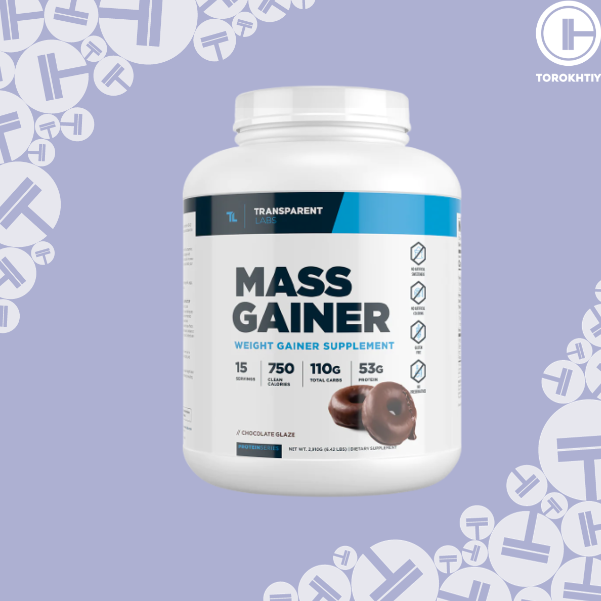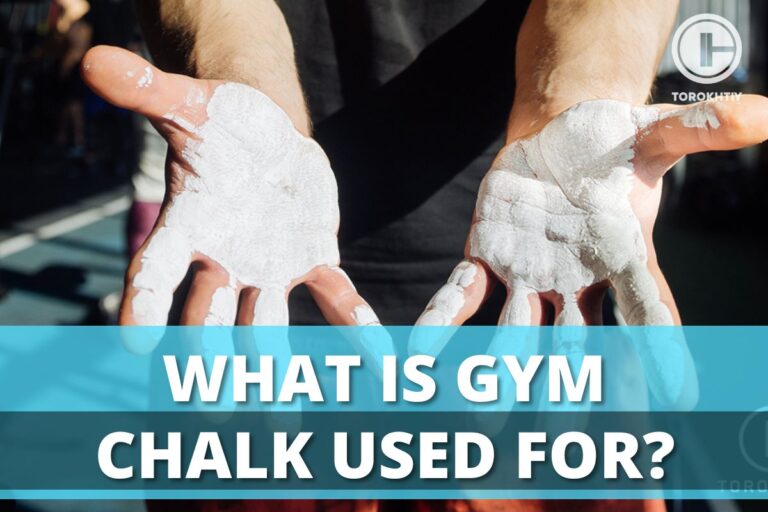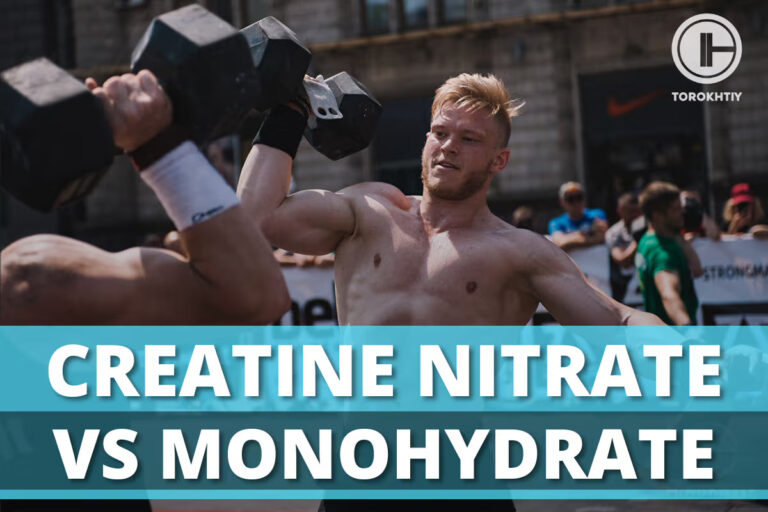Is Oatmeal Good for Bulking? – The Benefits of a Breakfast Staple
Oats are commonly used as a breakfast staple by recreational gym users and elite-level bodybuilders as a low-cost, convenient food source that can be mixed with a range of whole food sources and liquids.
Oats contain a good mix of high-quality protein, complex carbohydrates, and essential micronutrients. When weight gain is the goal, is oatmeal good for bulking? We’ve answered this question and given some lean bullying tips below.
Is Oatmeal Good for Bulking? Oatmeal is good for building muscle when bulking. It contains high-quality protein, complex carbohydrates, and essential micronutrients with a small amount of fat. This makes it a versatile food source to use for bulking when following our lean bulking tips below.
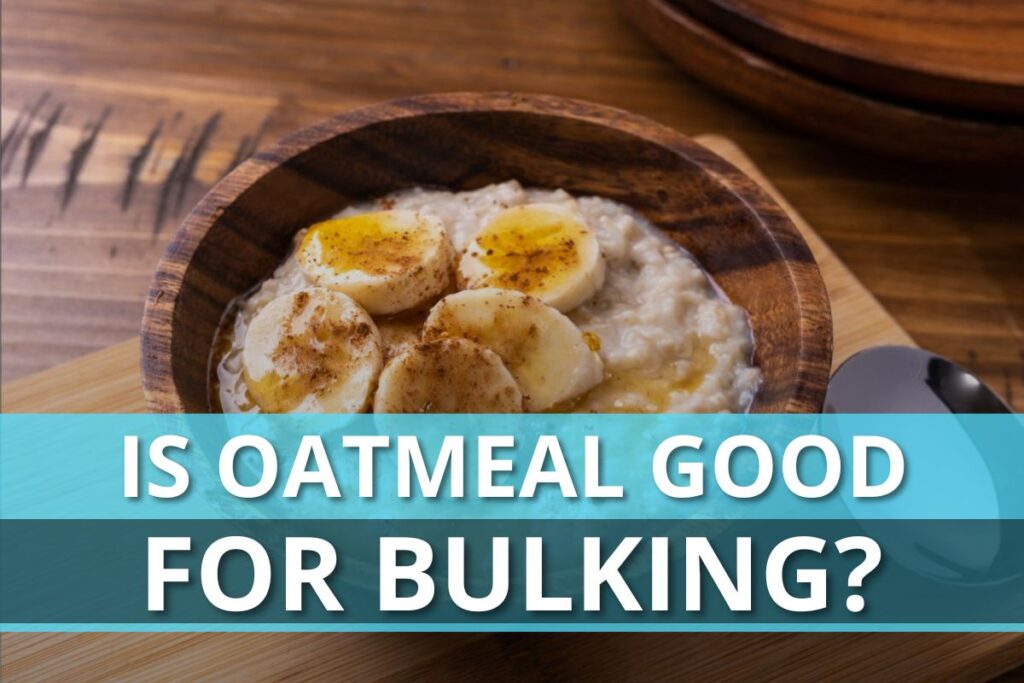
Is Oatmeal Good for Bulking?
Before we go into the reasons why oatmeal is good for bulking, let’s take a look at its nutritional profile and the main types.
One cup of regular oatmeal (unfortified) has the following nutritional value:
- Calories: 290 kcal
- Protein: 12 grams
- Carbohydrates: 51 grams
- Fiber: 8 grams
- Fat: 5 grams
These are the common varieties of oats and how they differ. In terms of the best oats for bulking, this depends on your schedule and you preferences for texture and flavor:
- Rolled Oats – Steamed oat kernels that have been rolled to increase their lifespan. They are an excellent source of complex carbohydrates and fiber. These do not take long to cook.
- Instant Oats- Prepared similar to rolled oats. Thinner so they are easier to cook and popular among bodybuilders. Just add hot/boiling water and they are ready.
- Steel-cut Oats- Minimally processed oats containing a high protein, fiber, and iron content. They have a lower glycemic index than the other types of oats. They take substantial time to cook
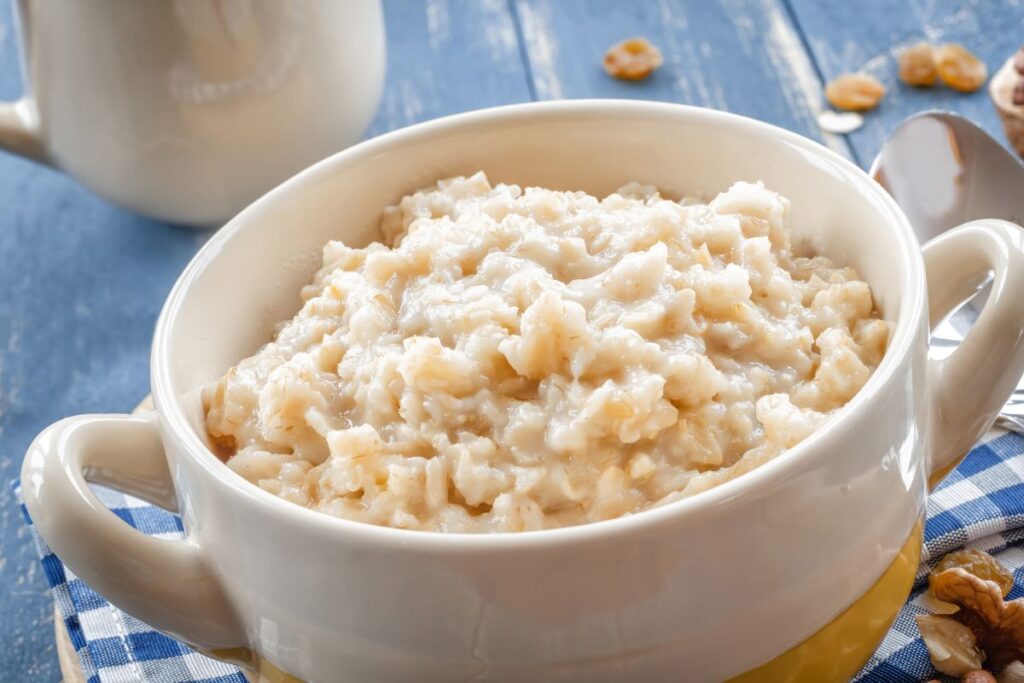
Oatmeal is an excellent source of nutrition for bulking due to its high protein content, mix of complex carbohydrates, high fiber content, and added micronutrients. It’s easily accessible, cheap to purchase, and can be mixed with a wide variety of whole-food ingredients and liquids.
In terms of bulking, oatmeal is somewhat of a nutritional powerhouse. We’ve explained the benefits in more detail below:
Pros of Eating Oatmeal for Bulking
Now that we’ve looked at the nutritional value and different rules of oats, is oatmeal good for bodybuilding? Here are just some of the many benefits oatmeal can offer for bulking:
✅ Versatility
One of the best qualities of oatmeal as a food for bulking is its versatility. The different types of oatmeal do not have strong flavors meaning they can be used for both sweet and savoury recipes as desired.
Some of the suitable foods and liquids that can be mixed with oatmeal include:
- Protein powders
- Fruits
- Seeds
- Nuts
- Seeds
- Nut butters
- Water and milk
Oatmeal is also relatively inexpensive and readily available in most small stores and supermarkets, making it accessible to most populations.
✅ High in Carbs
Oats are an excellent source of low-glycaemic, complex carbohydrates that provide a sustained release of energy for high-intensity, long-duration training sessions when bulking.
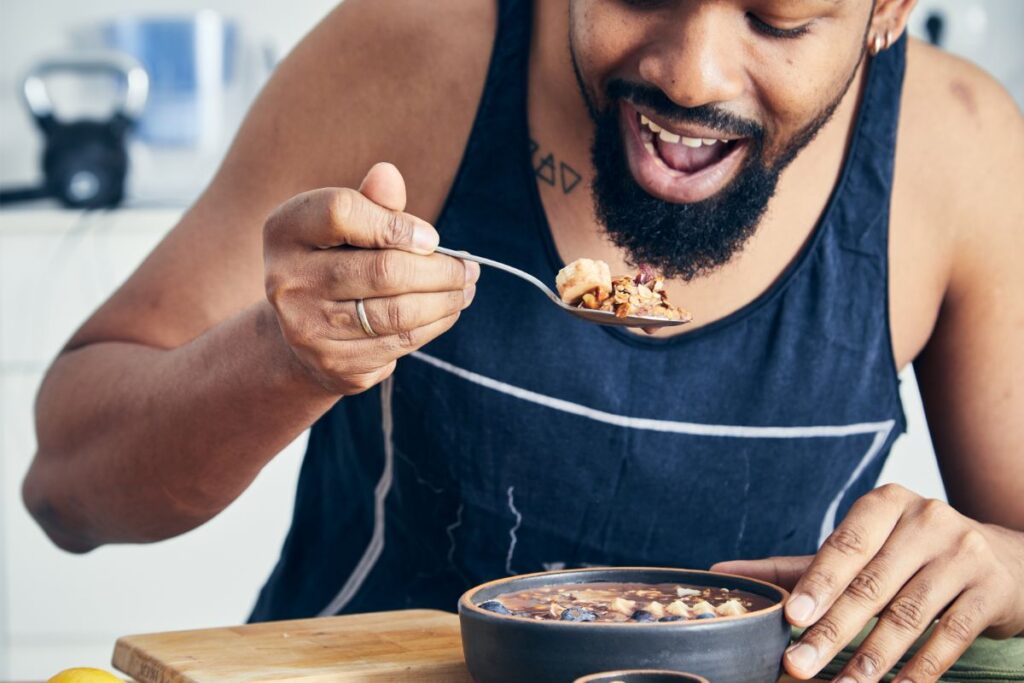
The high fibre content of oatmeal helps to promote satiety by slowing down digestion which means it keeps you fuller for longer compared to other foods. Other benefits of fiber include improvements in digestion and gut health.
✅ Contains Protein
When it comes to bulking, protein is important for muscle growth and repair. Hitting your daily protein intake targets alongside maintaining a moderate calorie surplus are two of the most important factors for successfully lean bulking.
Alongside containing a large amount of complex carbohydrates, oats contain a good amount of protein especially when mixed with milk. This makes oats a great food for adding to your daily protein intake target.
How Much Oatmeal Should I Eat for Bulking?
When considering how much oatmeal to eat for bulking, consider how many daily calories you need to maintain a modest energy surplus and the composition of your other dietary foods.
If you’re a large individual who needs a large amount of daily calories to maintain a non-aggressive surplus, eating 2-3 portions of oatmeal on their own or with different fruits, nuts, and powders may be warranted as a quick and convenient source of energy.
Whilst oatmeal contains a good amount of protein, complex carbohydrates, fiber, and micronutrients, it shouldn’t make up too much of your daily dietary intake. Prioritize a wide variety of protein sources, complex and some simple carbohydrates and healthy fats. These should give you a dietary intake that hits all your daily macronutrient and micronutrient targets that also fit into your daily lifestyle and food preferences.
Can I Eat Oats Every Day?
Oats can be eaten every day if desired for bulking and cutting. As a breakfast food or snacking staple added to a variety of fruits, fat sources, and liquids, oats have a better nutritional profile than many other convenience foods available to purchase.
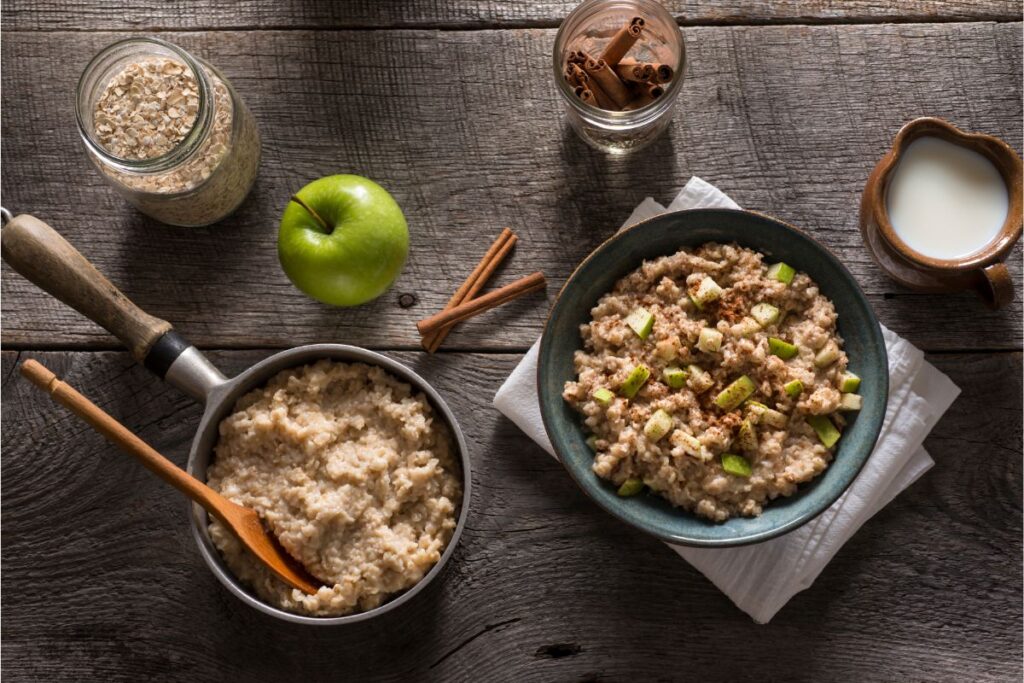
Consider your overall daily intake and daily protein targets when adding oats as part of your everyday diet.
Lean Bulking Tips
Follow the lean bulking tips below to pack on muscle mass while limiting the amount of fat gain.
1. Choose a Non-aggressive Calorie Surplus
Building lean muscle when bulking requires a calorie surplus, but in this case bigger doesn’t mean better. Your body has a limit to the rate at which muscle protein can be synthesised, meaning any excess calories will be stored as excess body fat.
Use a non-aggressive calorie surplus of around 250-500 extra calories above maintenance. Monitor changes in your weight and body composition and adjust accordingly.
2. Eat Enough Protein (1.6 to 2.2 grams/kg body mass)
Muscle protein synthesis (MPS) is the main driving force behind muscle growth as the body adapts to an exercise stimulus. Adequate protein intake provides stimulation for MPS, with a suggested daily intake within the range of 1.6 to 2.2 grams/kg body mass per day for optimal growth.
3. Engage in Strength Training Using Progressive Overload
While nutrition provides the nutrients for your muscles to grow and repair, strength training provides the stimulus to start the muscle-building process, also known as muscle protein synthesis.
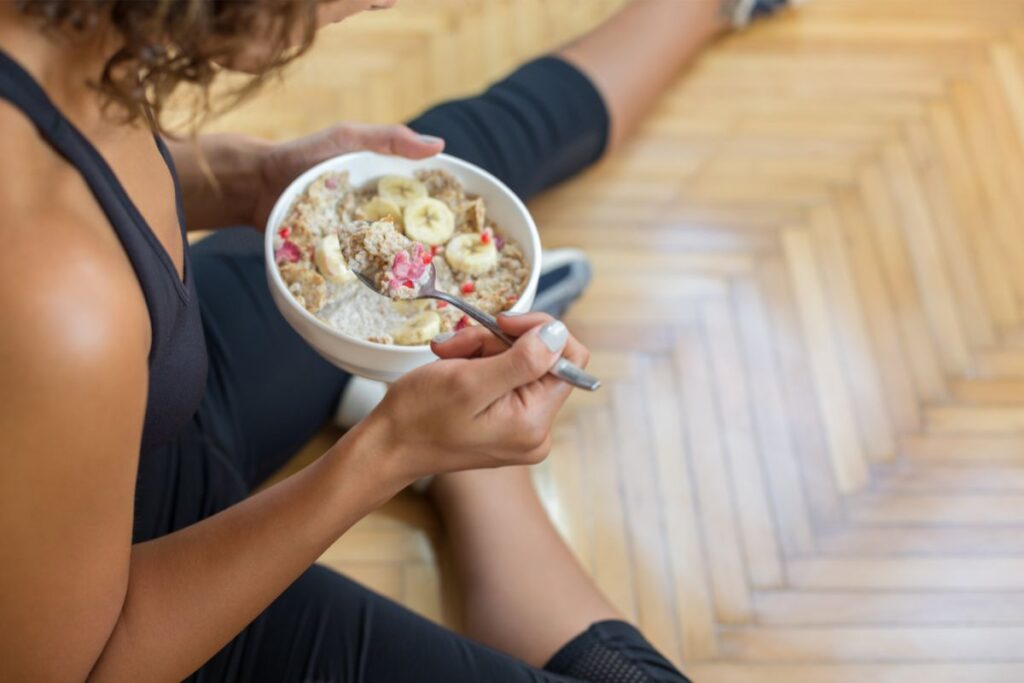
Use progressive overload as part of a well-organized training schedule, manipulating the training volume, frequency, and intensity with the help of a personal trainer or other professional. This helps to overload your muscles, allowing them to keep adapting to a new stimulus and preventing them from reaching a training plateau.
4. Get 8 to 9 Hours of Sleep per Day
During sleep, your body produces hormones that are crucial to muscle growth and repair. During this time, your muscles start the repair and rebuilding processes which, when done consistently, leads to muscle growth.
If you don’t get enough sleep, your muscles won’t have the chance to repair and rebuild properly which in turn limits the lean muscle-building process.
5. Have Patience and Be Consistent
Patience and consistency are two key factors when it comes to successful lean muscle gain. Progress won’t just happen overnight. Results will be slow and will take time to continue progressing, especially at a higher level.
Take your time, enjoy the process, and realise that the noticeable accumulation of new muscle tissue doesn’t happen overnight.
6. Limit Weight Gain to 1% of Total Bodyweight Per Month
As we’ve discussed above, there’s only a certain amount of extra muscle tissue that you can put on at any given time. Any excess calories will contribute to fat gain which isn’t something you should be wanting.
To avoid excess fat gain, limit the rate of weight gain to approximately 1% per month. With advanced athletes who are closer to their genetic potential, this number may be even lower.
Factors such as training experience, genetic potential, type of training, and gender may also be taken into account. Generally speaking, a higher surplus usually results in more fat gain. Take individual responses into account and adjust your intake accordingly.
The Transparent Labs Mass Gainer is a high-quality mass-gaining supplement formulated for effective weight gain and muscle building. Each 194-gram serving contains 750 calories, 53 grams of protein sourced from 100% grass-fed whey concentrate, and 109 grams of complex carbohydrates including 6 grams of fiber.
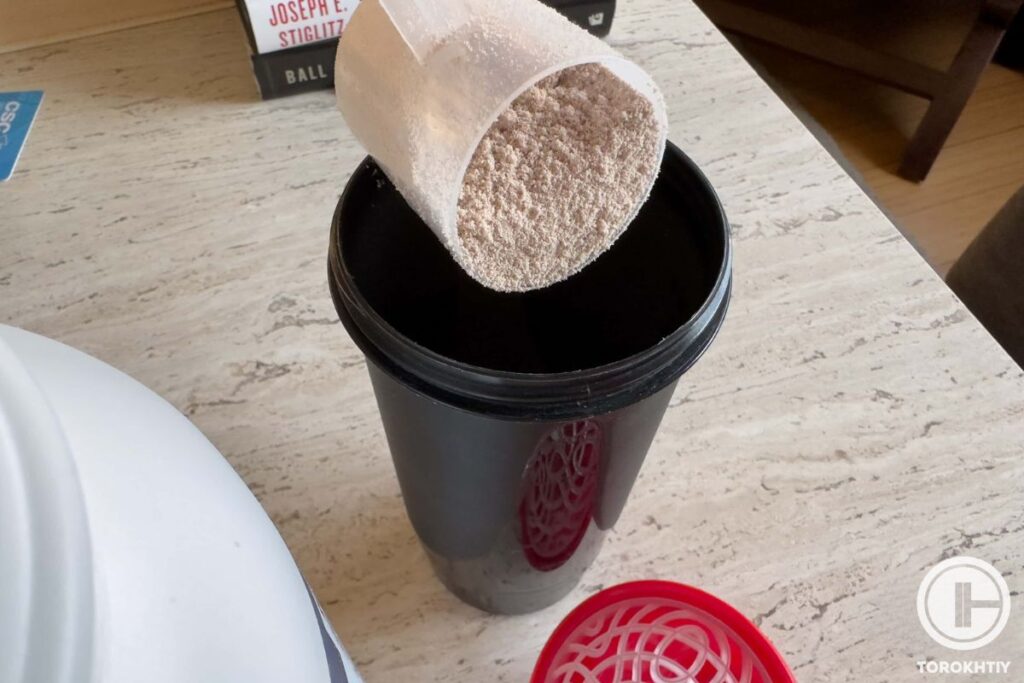
This gives you a super clean high-calorie protein source that contains no artificial sweeteners, colorings, or preservatives. It’s also gluten-free and non-GMO. Each tub contains 15 servings priced at $5.33 which offers decent value for money as a convenient weight gainer to be used alongside whole food sources.
FAQ
Is Oatmeal for Bulking or Cutting?
Oatmeal contains an excellent combination of high-quality protein, complex carbohydrates, and essential micronutrients to support muscle growth and recovery. There are around 290 calories in 100 grams of dry oats, making them a great food for both bulking and cutting.
If you eat oatmeal while in a calorie surplus you will gain weight. If oatmeal can be eaten while maintaining a calorie deficit, you will lose weight. Preference should be given to overall calorie intake and daily protein.
How Much Protein Is in 100G of Oats?
In 100 grams of dry rolled oats, there is about 13 grams of protein. This makes oats a great source of high-quality protein which can be mixed with a wide range of whole foods and liquids.
Can I Eat Oats 3 Times a Day?
Due to its favorable macronutrient and micronutrient profile, oatmeal can be consumed three times a day if desired. However, the primary consideration should be getting a balanced daily intake of all macronutrients and micronutrients using a variety of whole foods
If you can eat oatmeal three times a day and still hit these targets, there is no problem with eating them as desired.
Does Oatmeal Build Muscle?
Oatmeal will help with the muscle-building process by providing a good source of protein and complex carbohydrates which helps sustain a calorie surplus.
However, the main focus should be on hitting your daily protein and calorie intakes using a variety of whole food sources spread evenly throughout the day.
Conclusion
Oatmeal is an excellent food source for bodybuilders and gym enthusiasts looking to pack on high-quality muscle and size when bulking. Oats are packed with protein, complex carbohydrates, fiber, and essential micronutrients needed by the body to perform essential functions.
Mix them with a wide variety of whole foods and liquids as part of a well-balanced bulking diet with a moderate surplus and adequate daily protein.
Do you use oatmeal when bulking? What are your favorite foods and liquids to mix with? Tell me about your favorite recipes down below!
Also read:
- Does Mass Gainer Increase Belly Fat
- How to Use Mass Gainer
- Can You Do Cardio While Bulking
- Is Spaghetti Good for Bulking
- How to Gain Weight With a Fast Metabolism
References:
- Devebdra Paudel, Bandana Dhungana, Melanie Caffe, Padmanaban Krishnan, “A Review of Health-Beneficial Properties of Oats,” Foods 10, no.11 (2021):2591. doi:10.3390/foods10112591
- Ina Garthe, Truls Raastad, Per Egil Refsnes, Jorun Sundgot-Borgen, “Effect of nutritional intervention on body composition and performance in elite athletes,” European Journal of Sports and Science 13, no.3 (2013):295-303. doi:10.1080/17461391.2011.643923
- P. J. Atherton, K. Smith, “Muscle protein synthesis in response to nutrition and exercise,” Journal of Physiology 5 (2012):1049-1057. doi:10.1113/jphysiol.2011.225003
- Brad J. Schoenfeld, Alan A. Aragon, “How much protein can the body use in a single meal for muscle-building? Implications for daily protein distribution,” Journal of the International Society of Sports Nutrition 15, No.10 (2018). doi:10.1186/s12970-018-0215-1
- Roberto Bernárdez-Vázquez, Javier Raya-González, Daniel Castillo, Marco Beato, “Resistance Training Variables for Optimization of Muscle Hypertrophy: An Umbrella Review,” Frontiers in Sports and Active Living 4 (2022):949021. doi:10.3389/fspor.2022.949021
- James Wilson. Practical Periodization. International Sports Sciences Association. Available at: https://www.issaonline.com/blog/post/practical-periodization (Accessed January 18, 2024)
- Severine Lamon, Aimee Morabito, Emily Arentson-Lantz, Olivia Knowles, Grace E. Vincent, Dominique Condo, Sarah E. Alexander, Andrew Garnham, Douglas Paddon-Jones, Brad Aisbett, “The effect of acute sleep deprivation on skeletal muscle protein synthesis and the hormonal environment,” Journal of Physiology Reports 9, no.1 (2021):e14660. doi:10.14814/phy2.14660
Why Trust Us?
With over 20 years in Olympic Weightlifting, our team does its best to provide the audience with ultimate support and meet the needs and requirements of advanced athletes and professional lifters, as well as people who strive to open new opportunities and develop their physical capabilities with us.
By trusting the recommendations of our certified experts in coaching, nutrition, dietology, and sports training programming, as well as scientific consultants, and physiotherapists, we provide you with thorough, well-considered, and scientifically proven content. All the information given in the articles concerning workout programming, separate exercises, and athletic performance, in general, is based on verified data. We ensure that you can rely on our professionals’ pieces of advice and recommendations that can be treated as personalized ones which will benefit you and fully meet your needs.
The product testing process is described in more detail here
Author: David Sasha Schulz
Doctor of Chiropractic, BSc Human Biology, CSCS
Strength coach (CSCS) – 10 years
Sasha is a Chiropractor and Kinesiologist practicing in Kelowna, BC, Canada. He has been practicing Chiropractic since 2019, integrating manual therapy, strength training and programming principles, and nutritional strategies to get his patients optimal results. He currently scratches the competitive itch in fitness, and the occasional endurance race, and plays golf and snowboards for fun. He has an interest in all strength and fitness-related sports.

